#when he calls Sartre
Text

bad wolf soda <3
#level of obsession reached where i zoom in on screenshots to see what shes reading#p sure that says kierkegaard in white but thats as far as im getting#'first existentialist philosopher'#okay i really gotta find out what the fuck existentialism really means now bc carmilla seems to like it#'related to the meaning purpose and value of human existence.#Common concepts in existentialist thought include existential crisis dread#and anxiety in the face of an absurd world and free will as well as authenticity courage and virtue.'#SCREAM OKAY I SEE I SEE#kierkegaard beauvoir sartre nietzsche camus yep p sure those all get mentioned#okay this is fun#kierkegaard was like an existentialist before the word and hes from the first half of the 19th century#dont know if you can call vampires contemporaries of people bc....immortal. but carmilla was a contemporary of him#technically#and then when existentialism gets named halfway the 20th century carmilla has just escaped her blood coffin punishment#and so shes alone for a little bit without direction. perhaps free or perhaps waiting for mother to show up again#it's fun that existentialism seems sort of to be abt there being a choice abt who you want to be#that youre not defined by an essence. that What You Are is not defined pre what you do#so you can shape yourself#it's interesting the tension between that belief and the position carmilla is in. no wonder theres self-loathing#but also! she starts resisting the What She Is that is imposed on her. after 1945. starts sabotaging plans#i gotta go download some books#'ive got a talk i wanna catch on goethe' hang on im googling#1749-1832 she lived through that too#oh right faust and young werther i know of those#'Goethe admitted that he 'shot his hero to save himself' a reference to Goethe's near-suicidal obsession for a young woman a passion he que#relatable#god theres so much to read in the world and i have not read any of it#carmillaposting#i wonder what she'd write her dissertation about
4 notes
·
View notes
Text
i want whatever beauvoir and sartre had damn
#reading selected works by simone de beauvoir#obsessed with the fact she always calls him sartre when talking about him actually#it's like she doesn't want the reader to know how much he means to her while praising him to the heavens i love her
1 note
·
View note
Text
In his seminal The Wretched of the Earth, Frantz Fanon could be writing about Gaza when he said: “In all armed struggles, there exists what we might call the point of no return. Almost always it is marked off by a huge and all-inclusive repression which engulfs all sectors of the colonial people.”
In Israel, Gaza and the West Bank, that point has arrived.
From Gaza to the Red Sea, on all fronts the West is now unmasked as a lawless killing machine in terror of losing control. Genocide, starvation and war, defended with Olympic-level diplomatic double-speak, are its only answers to the fact that the Global South, and the nations of the Middle East (if not their leaders) no longer wish to live under US hegemony.
Jean-Paul Sartre, in his preface to Fanon's work, wrote of western colonialism: “Our Machiavellianism has little purchase on this wide-awake world that has run our falsehoods to earth one after the other. The settler has only recourse to one thing: brute force… the native has only one choice, between servitude and supremacy.”
Fanon was a revolutionary thinker and a practising psychiatrist of colonial racism and its psychic impact on the colonised, and the coloniser. He and Sartre were writing about France’s imminent defeat in Algeria after seven years of brutal war.
[...] Western powers are involved in conflicts thousands of miles from home, as they were in Fanon's time in Algeria, Congo and Indochina. Today the western political class has united behind Ukraine and Israel, but for millions of people it is no longer clear that the wars are worth fighting.
As Yemen’s spokesman, Mohammed al-Bukhaiti, put it: “The war today is between Yemen which is struggling to stop the crimes of genocide, and the American and British coalition [who] support its perpetrators. Every party or individual in this world has two choices that have no thirds… who do you stand with as you watch these crimes?”
Fanon, writing 63 years ago, agrees: “The colonial world is a Manichaean world… at times this Manichaeism goes to its logical conclusion and dehumanises the native, or to speak plainly, it turns him into an animal. The native is declared insensible to ethics; he represents not only the absence of values, but the negation of values… he is the enemy of values, and in this sense he is the absolute evil.
“The native knows all this, and laughs to himself every time he spots an allusion to the animal world in the other’s words. For he knows he is not an animal, and it is precisely at the moment he realises his humanity that he begins to sharpen the weapons with which he will secure victory.”
. . . full article on MEE (1 Feb 2024)
You can also find a free copy of Fanon's The Wretched of the Earth on the Internet Archive (available as a PDF, EPUB etc.)
1K notes
·
View notes
Quote
Et puis préserver mes brouillons... enfin brouillons. .. mieux ! des rendus... rendus émotifs ! ... déjà en presque formes venues ... des dix vingt mille heures de travail. Que c’est des mises à jour . Ça se débrousse comme le temple d’Angkor. C’est de l’acharnement de terrassier... de terrassier d’ondes... tout petit trait de scalpel près, le temple fripe, effrite, s’efface. Vous attrapez plus rien, rien vient... C’est la magie. La plume est un scalpel de mage... de mage en terrasse... Tout est enfoui dans l’atmosphère... Faut fouiller plan par plan... souffler, oh si doucement que le sable envole... C’est horrible, n’est-ce pas, c’est horrible ... je veux dire de délicatesse d’effleurement... C’est un travail de fée c’est tout, où l’homme périt damné, perd l’âme, la bonne gentillesse, la bite, tout. .. tourne chiffe, lavette à songe, épuisée loque, hagard terrassier, titubeur de mirage à l’autre, brandit sa pauvre ardoise de tête, qu’il a vu des plans, la comète, passée de cent millions d’années... qu’il a dit qu’il a l’étincelle, du météore enfoui devant que la lune naisse. Oh ! c’est du tourment pas dicible ...
Louis-Ferdinand Céline, Maudits Soupirs pour une autre fois
#despicable#despicable man#céline#no but just a fact#knows how to write about#writing#can't think shit outside of the reactionary#when he calls Sartre#damné pourri croupion#and fiente gavée de merde#un pamphlétaire jusqu'au poil (derogatory)#on poetics#words#quotes
0 notes
Text
When Aegon talked about his genital injury- there's an obvious callback to Game of Thrones and Theon. And the way they played that for laughs. The way Ramsay ate a sausage while Theon, tortured and broken and mutilated, was hung up on that sartre and we were supposed to laugh at this. They must have been calling back to that? Right? And yet... the way it is delivered. The way Aegon says it- dissociating- trying to explain to Larys just what was done to him. He's not just talking (maybe for the first time?) to someone with an empathetic ear about his injuries. But he is also using it to challenge what Larys is telling him. That there is a future for him. That there are better days ahead. How? When he is unable to put an heir on the throne to follow him? He has Jaehaera, but she does not fit in the narrow definition of what an heir is- just like Rhaenrya does not. Just as he (now) does not. I know that people did laugh. I know that there were memes. But I guess what struck me is how the "joke" is put into Aegon's mouth first. Instead of a joke that is made at his expense, it is a bitter/graveyard humor (??) that he himself is engaging in- or maybe he is just stating the bleak facts. Personally, I didn't feel like it was a joke- I felt like maybe the character was telling a joke to kind of deal with this horrific thing they went through- but even here Tom plays it as if he is dissociating a bit as he describes it- especially as he goes on to talk about what it is like to live with this kind of injury. I don't know what the writers' intentions were. But I know that Tom delivered it in a way where I just felt empathy and horror on Aegon's behalf. I felt the same (obviously) for Theon as well but he was never actually given to space to talk about it in this way. He wasn't allowed to engage in dark humor about it. Only others were allowed to relentlessly mock him- and Grey Worm, Varys and the Unsullied about it. And I found that enraging. Aegon is given the space to talk about it on his own terms and it seems in character. But I can also see how people would think the writers were trying to do a callback joke. Even if they were, I feel like Tom's delivery distracted me (me! who is obsessed with Theon and very sensitive to this sort of thing) from thinking about it as a deliberate joke until after the fact. What did you all think? In any case, Tom and Matthew gave an incredibly sensitive and compelling performance of it.
#aegon ii targaryen#theon greyjoy#layrs strong#tom glynn carney#alfie allen#matthew needham#tw genital mutilation#tw genital injury#game of thrones#hotd spoilers#house of the dragon
99 notes
·
View notes
Text
The Season's Been Laid Out in the Cards...
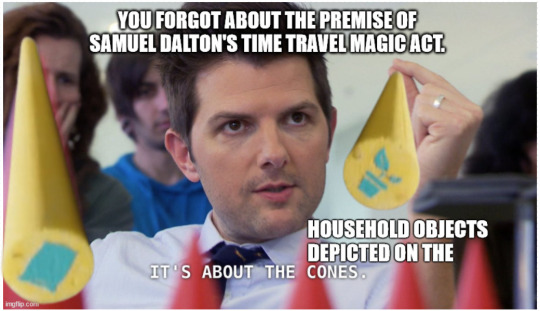

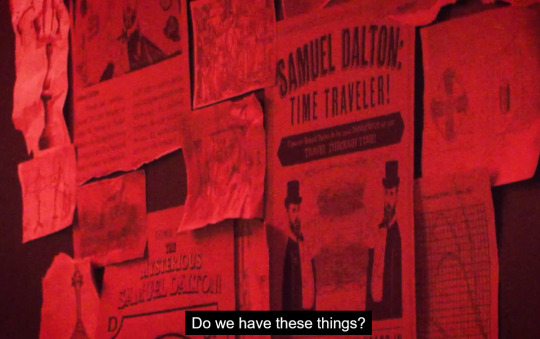
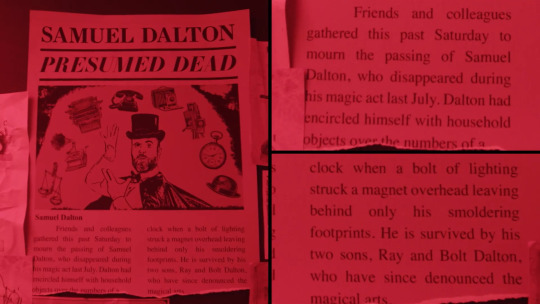


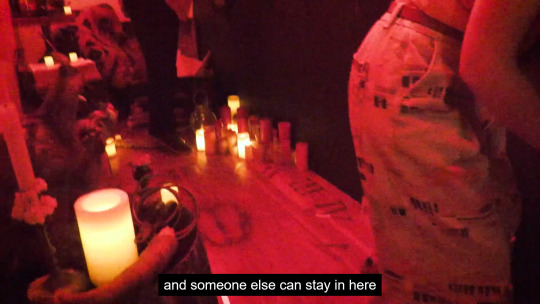
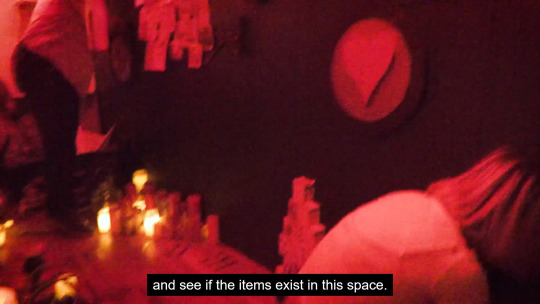
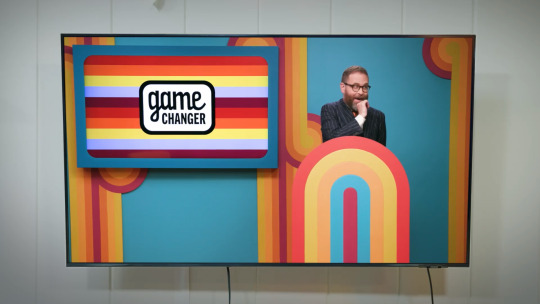

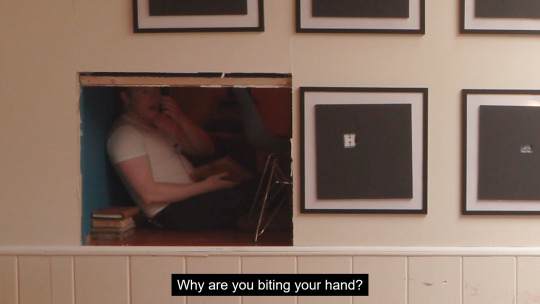
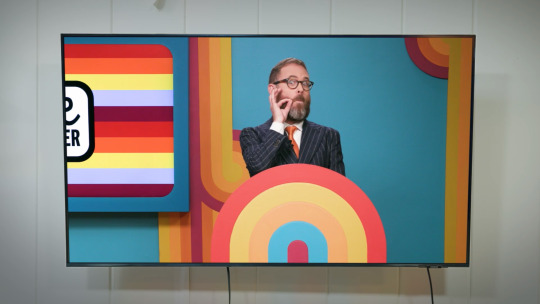
The above are a direct depiction of the editing of the show:
Lou views the wall of evidence with Sam Dalton, and says 'So it seems like it's about Objects. Do we have these things? Do we put them on the numbers? (This is correct to escape the step)
The lore provided for Sam Dalton's disappearance reads: "SAMUEL DALTON PRESUMED DEAD Friends and Colleagues gathered this past Saturday to mourn the passing of Samuel Dalton, who disappeared during his magic act last July. Dalton had encircled himself with household objects over the numbers of a clock when a bolt of lightning struck a magnet overhead leaving behind only his smoldering footprints. He is survived by his two sons, Ray and Bolt Dalton, who have since denounced the magical arts."
Brennan suggests someone goes out to start collecting the objects they need, and someone else "stay in here and see if they exist in this space". Sam looks shocked and delighted, looking offstage at someone, and biting his hand to stay quiet. Brennan notices, and asks "What are you biting your hand about?" suspiciously. Sam dramatically mimes zipping his lip and says nothing.
A couple of things that are not in the editing but personal theory notes:
This editing compared to the fairly clear and concise wrap-up on rewatch, especially Sam's over the top reaction to this bit, and the multiple maintained clips that carefully compare the red room to hell/purgatory (Siobhan calls it Sartre-esque, etc) while we are now seeing a decay makes me fairly sure it's foreshadowing.
Escape the Room aired in March, but if we have a 13 episode season again the finale will be in July, when Samuel Dalton disappeared.
I do not know if the episodes are meant to be in order, or if they're exact #s, but there are many things Sam has given this season (Plant, Watch, Jacket) as either prizes or challenges directly, OR episodes could be more metaphorically interpreted (Ace of Cheetos - the single episode designed to torture the snacker, Two of Pillows for the Newlyweds)
Episodes like 6x03 the Three of Coats for Sam Says 3 with a wardrobe challenge or 6x06 Deja Vu with a with a watch prize and time theme have all of the above etc
The Playing Card Items: Ace - Cheeto, 2 - Pillows, 3 - Coats, 4 - Lint Rollers, 5 - Plants, 6 - Clocks, 7 - Vases, 8 - Shoe, 9 - Fire Extinguisher, 10 - Guitar, Jack - Smoke Detector, Queen - Surge Protector, King - Paper Clip
The Other Items Surrounding Samuel Dalton: Scales, Phonograph, Typewriter, Rotary Phone, Photo Camera, Video Camera, Pocket Watch, Bowler Hat
#game changer#dropout tv#sam reich#samuel dalton reich#sam dalton#Yes i did spend too long looking for cheetos before i remembered brendan went keto#burn after scrolling#dropout
140 notes
·
View notes
Text
i'm sure i'm not the first one to notice this but i just identified an ldpdl book i don't remember seeing people talk about before so i had to share. in 1x06, louis seems to be reading jean-paul sartre's la nausée (1938)
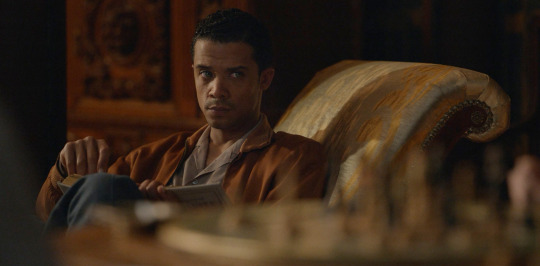
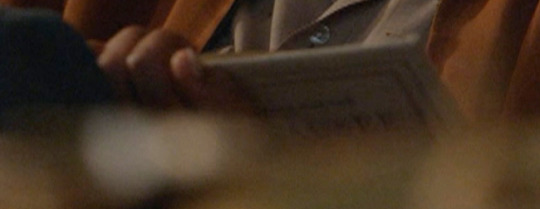


i just stared at shots of the scene until i was pretty sure the last letters were -ausée and then i ctrl+f searched that on a bunch of wikipedia pages on french literature until i found a match. i can't believe this dumb shit actually worked—the cover immediately looked familiar. louis's edition isn't exactly the same one pictured here but it's very similar.
wikipedia has this to say about the novel:
Nausea (French: La Nausée) is a philosophical novel by the existentialist philosopher Jean-Paul Sartre, published in 1938. It is Sartre's first novel.
The novel takes place in 'Bouville' (homophone of Boue-ville, literally, 'Mud town') a town similar to Le Havre. It comprises the thoughts and subjective experiences—in a personal diary format—of Antoine Roquentin, a melancholic and socially isolated intellectual who is residing in Bouville ostensibly for the purpose of completing a biography on a historical figure. Roquentin's growing alienation and disillusionment coincide with an increasingly intense experience of revulsion, which he calls "the nausea", in which the people and things around him seem to lose all their familiar and recognizable qualities. Sartre's original title for the novel before publication was Melancholia.
sounds like louis all right!
it also says the character "often resigns himself to eavesdropping on other people's conversations and examining their actions from a distance," which is pretty much what louis is doing in this scene.
la nausée being published in 1938 makes it brand new when louis picked it up (lestat's return to rue royale was in 1937.)
i haven't read this (yet) or any sartre at all but i'm sure some of you have so feel free to share anything that comes to mind about it :)
#iwtv#louis de pointe du lac#s#iwtv intertextuality#interview with the vampire#vampterview#vampyyrit
271 notes
·
View notes
Text
IWTV S2 Ep3 - Random Musings (Spoilers)
This was the best S2 ep by far; they're just getting better & better. I have so much to say; I can't even keep up. This is just the random stuff I don't have AS MUCH to comment on (yet).
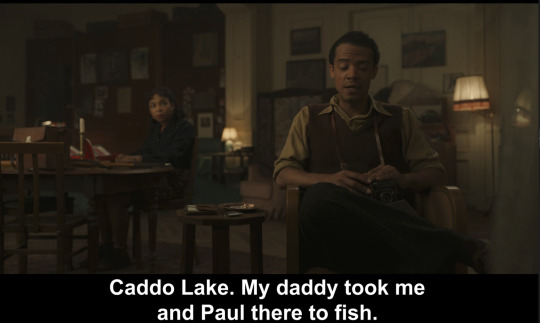
AMC, we GOTTA get some flashbacks of Papa DPDL. We know so much about Les' folks, but nothing about Lou's pops. :(
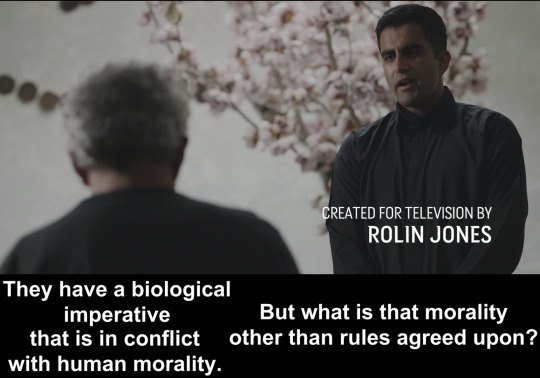

Not "Real Rashid" going bar for bar vs Sartre abt morality & evil!? 👏
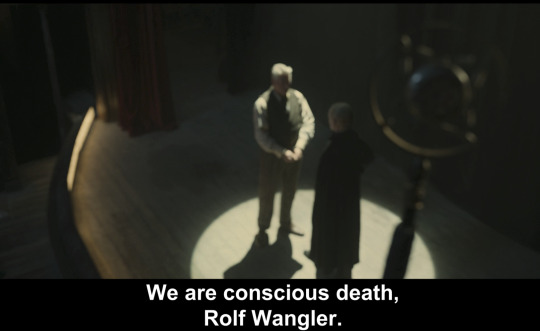
"Wolf Wrangler," I hate this effing show so much, please stop it.

SANTIAGO BACKSTORY LFG; we're finally being fed!

Ohhhhh.... Francis "Santiago" Naughton, I see~! They're definitely leaning into the Sant-"iago" of it all from Othello--nice touch!

1921--Santiago's a BABY vampire. (And omg he loved Annika's "performance" so much that he incorporated it into his regular lineup! Sickos! XD) I saw the Siophmedia review call it the Mimic Gift, which I love--expanding the AR lore.

Thoughts & prayers to this dude, being stuck for all eternity as an old man; relegated to backstage work with the noob stuck for all eternity as a little girl. (Hilarious how this is in blatant violation/disregard of Marius & Rhosh's Great Law #2 about beauty.)

Vampires sneeze?! 😂 Estelle is the ONLY Theatre vamp I like, bless!

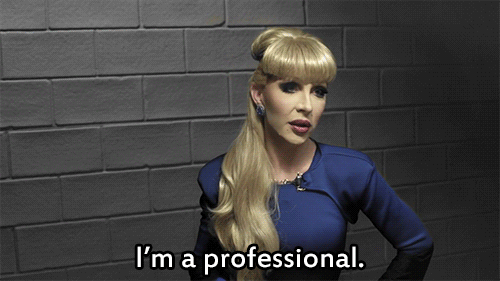
ROTFLMFAO. Humor on this show comes from the WILDEST of places; I love it.

Someone's saaaaaaltyyyyyy~! 👀👀👀👀
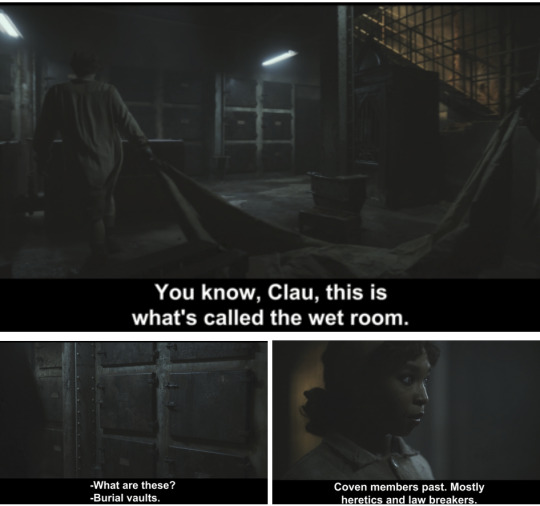
Welp, now we know where Louis'll spend "ETERNITY IN A BOX," when they drag him in that burlap sack.
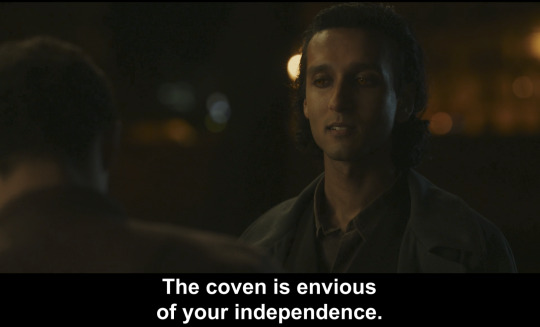
Louis' a strong independent man don't need no coven! 😤👏 Especially not you WEIRDOS. Monsieur LDPDL would NEVER allow anyone to make him act like a clownish BUFFOON on some stage, or write/film creepshows everyone points and laughs at, are you crazy?

Louis said SKILL ISSUE. 💀
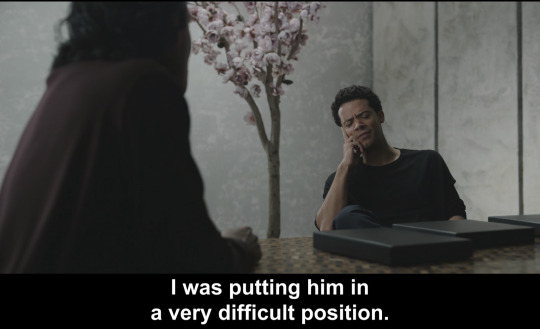
Don't act coy now! XD You go and OWN your bussypowers, Louis of Troy! ( ͡° ͜ʖ ͡°)

I am STUNNED this trash liar won a Pulitzer for investigative journalism. Truly a dying industry.
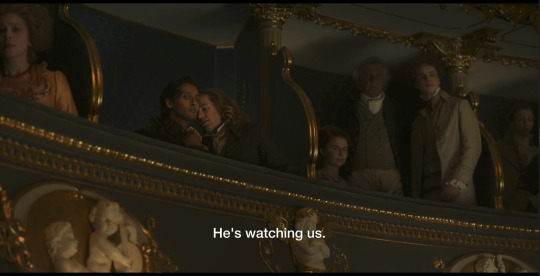
Armand, my love, you have no idea. 👀

Deflection & misdirection, as usual with these vamps.
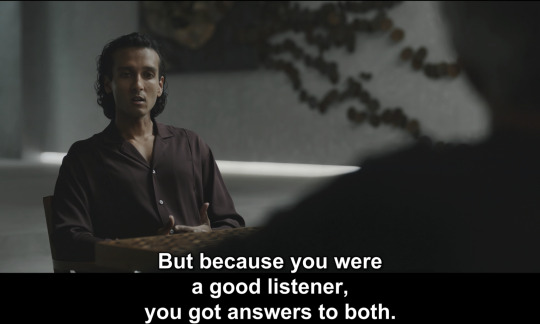
SHADE.

Roget the "FIRST" eh?... 🧛🏼 This completely removes Nicki as the founder of the Theatre, but I guess it makes sense that Armand would be the one communicating with Roget, cuz lord knows Nicki wasn't "fit to pick an apple off a tree in his current state...." 👀👐 Louis, Armand's fed you a crock of lies; don't be fooled by his pretty doe eyes! You were SET UP, my guy; he was SICK of that coven for hundreds of years; WAY b4 Lestat AND YOU showed up!
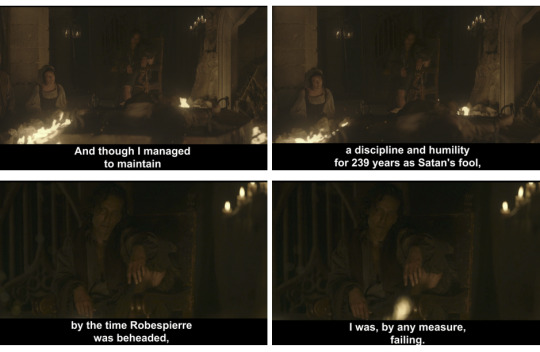
Then he hangs Lestat's portrait on the wall as a shrine and says he's their co-founder, while breathing not a word about how Lestat gave the Theatre TO NICKI, NOT ARMAND. Where's Nicki at, Armand!? 👀👐 Where's Claudia at, Armand!? 👀☀️ Why do all of Lestat's fledglings go missing under YOUR supervision, Mr. I Could Not Prevent It? I swear, those 🥺👉👈 eyes are lethal weapons!
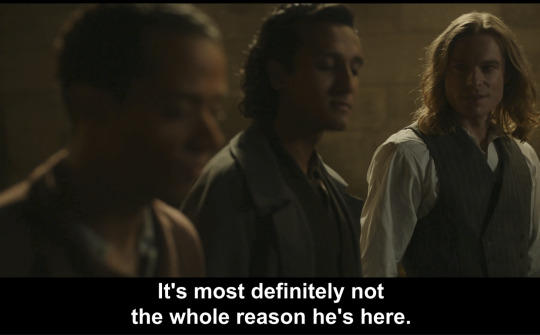
STUNT QUEEN. Behind every gay man is a gayer, more evil man!
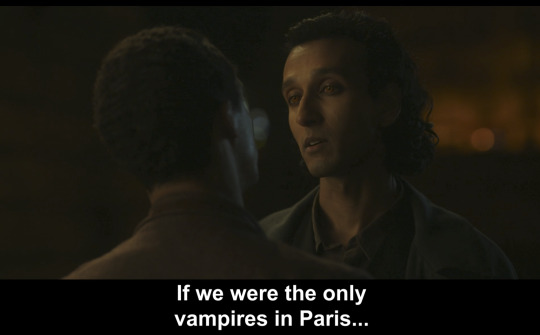
And he took that PERSONALLY.


Siri, google when butt-plugs were first invented.

Armand's FACE! 😭 Yeah, Lou don't make a lick of sense sometimes. Thank god he's pretty! But for every ounce of pretty there's another TONNE of mental trauma. If I were Armand, I'd've cut my losses and left Lou's arse to "Bruce" right then & there. Now look at you!
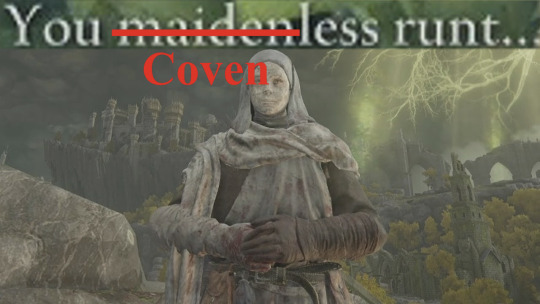
Incredible episode. 👏
Preview for Ep4:

I hate it here. 😱
I'm sorry, but I simply CANNOT with Loumand, knowing what's coming. I never have, and at this rate I NEVER WILL! Armand, I don't care what weird dynamics you & Lou are always up to, but by putting your hands on MY daughter!? DISHONOR!

Armand, Louis is right: you just earned yourself a spot on my hit list.
I'll rant about Loumand specifically in a separate post--this ep was A LOT, omg I'm exhausted.
42 notes
·
View notes
Text
When naming the members of the Théâtre des Vampires, Armand introduces Louis and Claudia to their “playwright in residence”, one Samuel Barclay (“Sam. Call me Sam.”). This is almost certainly a reference to Samuel Barclay Beckett, the famous modernist writer, theatre director and playwright. The style of theatre that Beckett was instrumental in creating, the so-called Theatre of the Absurd, with its focus on existentialism and tragicomic tones, shares some notable characteristics with the plays shown at the Théâtre des Vampires; Louis’ complaint that “They were weird! And always ended in death or some kind of cruel, barely motivated violence.” feels affectionately pointed. Beckett’s most famous work, Waiting for Godot, has also been confirmed by a reviewer to appear in the show (“Santiago fuming about the lack of action in a vampiric version of Waiting for Godot”). The choice of name and the inclusion of a play that was written during this period of Louis and Armand’s lives (“The Paris Albums, 1946-1949.”) but did not premiere until 1953, could suggest that Sam is meant to be the man himself.
This is not the first time the show has played with the idea that a famous writer may have been a vampire, however, unlike Emily Dickinson, Beckett was alive and working in Paris until his death in 1989. Considering the ending of the show’s source material, it seems unlikely that Sam will live that long unless he independently parts ways with the Théâtre des Vampires. It is also notable that, if intended to be a cameo, Sam has been quite underplayed compared to historical figures like Jelly Roll Morton and Jean-Paul Sartre. Though the supposed playwright for the company, Sam is shown selling tickets for the performance and collecting laundry rather than, say, giving notes on that night’s performance. Sam is presented as apart from the other members of the coven; absent during their prank on Louis and Claudia, not joining in the ensuing greetings, and leaving during the introductions. This framing of the character suggests that he is therefore not intended to be the real Beckett. Perhaps then the name was chosen by Sam himself in an attempt to emulate a writer he admires. Perhaps it is meant to further emphasise the strangeness of the supposed playwright for the company having the least interaction with its members, while only being shown to perform menial tasks. Or perhaps this is simply a reference made by a team of writers with backgrounds in theatre.
#there are a lot of differences between the coven's plays and the Theater of the Absurd do not get me wrong#in particular that the former all seem to have some form of coherent plot whereas the latter could often be deliberately nonsensical#and the splattergore is certainly particular to the vampires#would love to read a post season analysis on the use of theatre from someone who has a background in these types of plays#the tinfoil hat I have carefully constructed regarding Sam is that he is not the sole playwright for the coven#potentially he could only be considered the playwright in that he literally types up the scripts with minor corrections or additions#and actually Armand has a lot bigger role in the stories produced#were there not photos someone produced of the posters on the theatre for the trial with Armand's name on them?#he could not prevent it indeed#if it is intended to be Beckett then I would presume he is meant to have become a vampire after his real life stabbing in 1938#Sam Barclay#Armand#Interview with the Vampire
23 notes
·
View notes
Text
Trauma Team Artbook Character Bio Lore
...As gleaned from running artbook scans from 2014 through a sketchy machine translation in the year 2023. I won't post the exact translations for fear of mistranslations ending up reported as fact on wikis and so on, but here's the gist of what Google Translate yields.
CR-S01
Is named Erhard Muller, a fact that already made the rounds in the 2010s
His nationality is also listed as German, though he clearly spent most of his life in America
Most of his backstory isn't anything new compared to in the games, but the artbook does provide a timeline: adopted by Professor Sartre at age 9 after his parents died, enrolled in medical school at age 12 and hailed as the youngest ever to do so, age 13 when Rosalia was adopted, age 16 when the Cumberland Institute incident happened
Erhard and Rose weren't super close siblings, but got along well enough and they had happy lives until the bioterrorism attacked
The government 100% knew Erhard wasn't the culprit when they arrested him - he was the public scapegoat because they couldn't find Albert Sartre, their real person of interest. They never stopped looking for Sartre, and S01's work to reduce his sentence was a quiet compromise for the fact that they, y'know, ruined this kid's life
After learning the truth, S01 is disappointed at his father's betrayal but also chooses to take blame for Sartre's crimes and work off his sentence rather than expose Sartre as the true culprit
Not in-game lore, but according to the concept art section he was nicknamed Chris (CRS) during development. Other people will be funnier about this than I am
Maria Torres
Has the shortest bio and the least amount of new information along with Tomoe, honestly
Born in the slums
Was already at the orphanage at age 10 when Rosalia (age 3) came there
Ended up in rehab of some kind after the orphanage fire
Hank Freebird
Also doesn't have much new compared to the game, sadly
Joined the military out of a sense of justice, left out of disillusionment following John's death and used the medical knowledge he gained in the military to become an orthopedic surgeon (not that this wasn't already implied in the game)
His bio specifically calls him out for being kinda clumsy/goofy. Poor guy
Tomoe Tachibana
Honestly the only thing that's new is a bunch of names, so this is the one time I break my rule and cite a translation directly. TAKE THIS WITH A GRAIN OF SALT, IT'S STILL A MACHINE TRANSLATION
The only daughter of the Tachibana Zaibatsu, a global organization run by a family descended from the leader of the Koga Shinobi Army, Hisayori Tachibana.
Gabriel Cunningham
Nationality is listed as Great Britain. Surprise!
His wife Lisa left him with Joshua and went to her parents' six years before the game because she didn't like his lifestyle
Lisa was willing to get back together if Gabe was ever willing to talk to her properly, but as seen in the game he kept his distance. He and Lisa met occasionally over the next six years, but he never saw Joshua - which is of course why Joshua never recognized him in the game
His decision to go through with the divorce was about acceptance of his failings and a desire to do right by Joshua and Lisa
Naomi Kimishima
NOW WE'RE COOKING WITH BACKSTORY
All right, so that bit in Second Opinion where she took a Savato sample after cutting ties with Delphi and used it to bargain amnesty with Caduceus [Europe in the US version; US in the JP version]? Yeah, apparently she transported that sample by CARRYING IT IN HER OWN BODY for Caduceus to extract
Her fatal condition is a result of that, though it's already implied to be a result of GUILT in the game anyway. It was a sudden development a few years later, followed by Derek's six-month diagnosis
There's also details about her illness! Apparently her specific brand of PGS or whatever involves excess serotonin and dopamine production, which she needs meds to regulate.
It also means she's no longer able to operate on the living, which is why she transitions to forensic medicine as part of her plea deal
[Insert grimace here] I don't want to get too into this because this bit because 1) machine translation fears, 2) even perfectly translated it's not likely to be accurate to actual philosophy/terminology anyway, 3) I'm not a doctor I don't know what I'm talking about…
But the bio then starts talking about pranayama and prana, defining prana as life essence and...saying Naomi lacks it because of her condition and its effect on serotonin? I'm not entirely clear on this and I'm hesitant to say anything for sure; the main thing is that they take her illness and use the concept of prana to connect that to...
Her new ability to hear the dead! Apparently Naomi reads the prana left behind in a corpse and translates it into the person's final words via her phone; the worse the damage to the corpse (e.g., skeletonization), the less prana remains and the weaker the voice she hears is
Whether any of this relates to the Healing Touch is not mentioned. IDK man
Technically this was in S01's bio, but it relates more to Naomi: Jacob Tillman originally wanted Naomi to perform his surgery and keep it secret. Naomi was already unable to perform surgery on living people at that point, though, so S01 was Plan B
Rosalia Rossellini
Admired her big brother Erhard :(
Albert Sartre
Adopted Rosalia to study the virus in her blood (that is, he already knew about it by the time he adopted her in case that's ever a timeline question)
Additional Note
If someone with actual knowledge of Japanese corrects me and anything I've written in here, absolutely believe them over me. I'm not the translation hero anyone still in this fandom in the year 2k23 deserves, I'm just the stopgap until maybe one arrives someday.
#trauma center#trauma team#trauma series#trauma center series#cr-s01#crs01#erhard muller#naomi kimishima#tomoe tachibana#hank freebird#maria torres#gabriel cunningham#rosalia rossellini#albert sartre#artbook#man i hope this post works this time#free me from reposting#UPDATE: IT WORKS#THANK GOODNESS
73 notes
·
View notes
Text
What if Dreamstat is really just Lestat astral projecting from the depression slumber he has going on??!!! No, cause when he called Louis a little whore, I laughed and was like "girl why do you hate yourself?", but the bit about 18th century Armand got me thinking "what if this is the real Lestat?". Of course it could be just a reflection of Louis' doubt, but then again, why specifically 18th century? Why not "let me tell you something about Armand", it would get the point across well enough. If it is Lestat, he's still looking out for Louis, even though he killed him (tried, anyway. or somewhat tried... he went along with Claudia's plan... for the most part) and yes, Lestat had it coming (he only had himself to blame), but I don't think that he would ever accept that, in fact, I don't think he ever considered that the things he did were fucked up, except maybe after episode 5, but still, to me it felt like he thought Louis and Claudia were overreacting, like the domestic abuse wasn't that big of a deal (and honestly that's what i feel like a lot of people act like in this fandom. To the point of them saying it's a false memory that Armand put in Louis' head and so on and so forth, like, are we really doing that??? In 2024, we're doubting domestic abuse victims?! Is that what we're doing here?! Wow.). But like I was saying, you know, generational trauma and all that, Lestat's father was an abusive controlling piece of shit and he became just that, but failed to recognise it and to him his actions weren't as bad as his father's, cause he could never be like him (in his head), so surely that episode was like a fluke or something, not a big deal (again, in his head), to the point that he thought some gifts would fix everything. Anyway, what was I saying again? (I have adhd, don't come for me). Right, so, if Dreamstat is real Lestat's astral projection, then he really loves Louis (sometimes I doubt it, feels more like possessiveness than love, but i guess it can be both), or maybe that's just what Louis wanted to (cause real lestat would be crying, screamig, throwing up and killing jean-paul sartre as a form of protest if he saw louis on a date with another man, not just calling him a whore, so there is that). Also the fact that it's called "Dreamstat" it's kind of suspicious to me.
#loustat#interview with the vampire#louis de pointe du lac#lestat de lioncourt#armand de romanus#claudia iwtv#interview with the vampire amc#dreamstat
15 notes
·
View notes
Text
IwtV s2e3 rewatch notes
Because once again everything is happening so much and I need to take notes xD
(spoilers for show and books behind the read more)
So Daniel is allowed to leave the penthouse, didn't seem like it before. Is this a test to see what he'll do?
My man your handwriting is as bad as mine xD
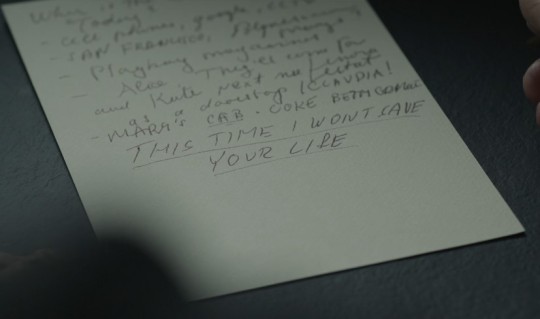

"Where is the coven now(maybe)??? Today? Cell phone, Google, CCTV. SAN FRANCISCO, Polynesean Mary. Playboy Magazine. Alice. They'll come for Lenora and Kate next. nee (use??) Lestat as a doorstop/CLAUDIA!. MARA'S CAB. COKE BETTY GRABLE. THIS TIME I WONT SAVE YOUR LIFE"
so, "Raglan James". Why that character? If it is him. I guess can't have Mr. Superior General running around spying on vampires in Dubai but...this guy? So if it it's really Raglan my guess is he's not really Talamasca any longer and he's spying on vampires because he's looking for one recless enough to do the thing. And he thinks Daniel is his best bet on getting the intel.
"You're not the first to attempt this, Mr. Molloy. I could give you the names of four others who have and they're all dead. Or undead." Yeah, that tends to happen when you lot tangle with the vampires xD
"How many Rashids, Rahid?" I guess poor Real Rashid can be glad Daniel's not calling him Renfield LOL
"They are peaceful beings"....who eat people. My dear Real Rashid, I don't think that word means what you think it means xD
Armand stop making heart eyes at Daniel (actually don't xD)
Blenders mention (also they're not trying to sell them to you, you little gremlin, because you already bought so many xD)
Still very much "Sure, Jan" about Armand's story about how he met Lestat. I mean, he's clearly telling it with the agenda of making himself look better, understandable. But also he's making Nicki out to be some little fling Lestat didn't care about and he hates Gabrielle so much he's not even mentioning her. Sure, Jan xD
But dang every one is acting their hearts out and they're all so fabulously good at it.
You know the one thing really in character for Lestat in Armand's story? Dragging around a whole ass crucifix to make a point xD
Armand's definition of unharmed is as bad as Rashid's definition of peaceful LOL
"You led him there so he could destroy it." Hit the nail right on the head. Armand wants to get rid of the Children of Darkness? Oh look, a vampire who doesn't obey the rules and can help him with that. He wants to get rid of the Theatre de Vampires? Oh, look, a Louis.....
Still so amusing how Lestat's hair in Armand's story is always on point and how it's mostly terrible when Louis hallucinates him xD
I'm guessing these be their laws in Latin, my Latin is rusty and I never was much good at it but

looks like "III. Nullus lamia vampiris debet scibere historiam" for example and google translate says that's "No one should know the history of vampires" so....
I still think the whole sexual assault thing with Claudia is unnecessary. Bad choice to do that, imho.
It's so heart breaking to see how much Claudia wants to belong with the Theatre coven. Vampires are still arseholes and always will be.
When's a door not a door? xD sorry, but that's basically my only thought about Armand's entry there.
Not Louis taking a picture to see if Lestat's actually there or not.
I feel like it's a bad idea to open a chat conversation with Daniel when the vampires can read his mind. Seems like a sure way to be found out....
Louis getting philosophical and Daniel just hammering at buttons because his computer is being taken over is funny, ok? xD
Those Talamaska files are interesting. "PC Members Extinct 1556-1949", "Armand (Arun Amadeo)".
Hm, I feel like talking loud enough for Sartre to be annoyed by it about killing people seems like it's breaking your laws a lot, Armand LOL
Also Dream Lestat is being a right bitch, it's hilarious.
Louis, darling, you're losing it, you need therapy
How about telling Claudia they're all on to you? Would be a good idea before she joins their coven, one would think...
Why is Santiago's last name Windsor? xD like no, he does not look like a Windsor. I thought he was one of the one name gang, like Madonna LOL
And the Talamasca just spoiled Daniel about what will happen to the Theatre, rude xD
Of course Armand would make it out to have been Santiago who demanded he take out Louis. Sure, Jan.
So fucking dramatic to take Louis into the sewers and threaten him and then actually do nothing at all to him.
Louis, you really should not be turned on by people who just said they should kill you, dear xD
Yeah, casting Claudia as the baby is not fucked up, at all....
EDIT: also apparently this Theatre coven doesn't wall people up, they put them in the morgue fridges xD (which usually are one big fridge inside instead of many little ones but I guess they'll not do that here....)
over all, very fun episode, and stellar performances from the whole cast but especially Assad and Jacob.
16 notes
·
View notes
Text

Phoebe Bridgers. Julien Baker. Lucy Dacus. What happens when three of the most talented solo singer-songwriters of a generation get together? You get something disarmingly funny, haunting, queer, something sui generis. Plus the best love song playlist ever. Meet The Band— a.k.a. boygenius.
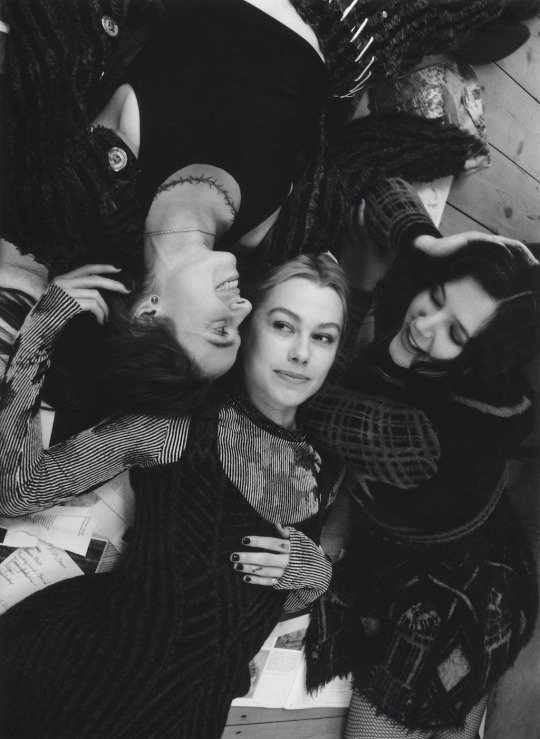
From left: CHOPOVA LOWENA fringe denim jacket. PAOLINA RUSSO bodice mini dress and knit top. CHOPOVA LOWENA zip cardigan and fuzzy skirt; FALKE tights.
Nicolaia Rips: How are you guys? You’re all individually at home hanging?
Lucy Dacus: Phoebe and I both just got back from, what, five weeks of being away or more. I’m jet-lagged. I was sleepy at 7 p.m. and I had a friend come over and kind of push me until 10 p.m. so I wouldn’t fall asleep while the sun was out.
Nicolaia Rips: How’s tour?
Lucy Dacus: The tour, like, all of it has been awesome. Our next show is Boston. Right? Or is it New Haven? I don’t know. (Julien pops into the zoom, just the tip of her baseball hat as she slowly emerges into frame.)
Julien Baker: My phone died and then I just...Hi, I’m here now.
Nicolaia Rips: If boygenius was a family who’s the middle child, who’s the eldest?
Phoebe Bridgers: Am I the youngest?
LD: No!
JB: No. You’re not youngest! I’m youngest.
LD: Julien’s youngest.
PB: You also are literally the youngest.
LD: Is it boring to say that it’s just how the ages are? Me and Phoebe are both older sisters to younger brothers and Julian is an only child. I think you’re big sis Phoebe. Big brother. Big sis was weird.
PB: My brother calls me sis to give me the ick. He’s like, I love how they do it on TV. They’re always like, “what’s up, sis?” Who the fuck calls their sister that?
NR: The film [directed by Kristen Stewart]. The record. Can you talk about the finality of “The.” What other “The” would you want to do in the future?
LD: The amusement park, uh, the strip club...
JB: The musical!
PB: It’s cool because we wouldn’t do that in our solo work. I think it just highlights the specialness of the time. Like we’re setting out to make the boygenius things right now.
LD: It’s also acknowledging a bit of hype, which is fun because we’re members of the boygenius fandom ourselves. So, people asking for the record, we’re able to give them the record.
NR: What makes something a boygenius song versus a solo?
LD: At least for me, context changes what I write about, and how I write. So, we just decided to be each other’s context for a couple years. It’s not some big secret, we chose to do this, to devote space and time.
NR: Your music feels so vulnerable yet there’s always this play. How do you feel your senses of humor factor into your work?
PB: It’s silly. We kind of enable each other. I feel like there have been several times where I’m like, am I allowed to write this? And the boys were like, yeah, obviously.
NR: What’s on the essential boygenius book list? The Book Club?
LD: Myth of Sisyphus.
PB: Stop!
LD: What are books that we’ve all read? Like Carmen Maria Machado, both of her books. The Sympathizer, we all loved. Letters to a Young Poet.
JB: I’ve heard y’all reference a lot and it’s nice to feel like ideas, instead of slipping into like a landfill or whatever, get recycled to me. I don’t know, I just like hearing y’all talk about books that I haven’t read too.
PB: That’s my main experience. I’m always the one that did not read the thing. I read way more because of this band which is so tight.
JB: I feel like you’re always reading essays on some lane of art and I’m just like, dang, all I read was a graphic novel and Sartre again.
LD: Sartre again. Y’all have podcasts. I’m completely out for the podcast conversation.
JB: Phoebe got me into podcasts. I used to just be like, it’s not radio, I don’t understand it. All the podcasts I listen to are just things [Phoebe] told me to listen to —99 PI, Hidden Brain.
PB: I do not have the strength to have thoughts when I’m doing things.
NR: I was listening to My Favorite Murder a while ago and was like, wait a second. Is that Phoebe Bridgers??
PB: I felt so nervous. I think that’s the last time I had actual stage fright.
LD: Is that the one where you say, “yeah, me and my friend Lucy kissed” and then everyone freaked out?
PB: Now, no one could possibly get freaked out by us kissing. It’s just part of it. “I went to a Boygenius show and Julien and Phoebe or Lucy and Phoebe kissed.”
JB: There’s a picture of me and Lucy and my mom asked if it was the guitarist from Muna because I think she saw one picture of me and Joe [Maskin] kissing and thinks we’re dating. Mom, you’re on Twitter? Like she’s following me? I felt love.

From left: S.S. Daley monogram tailored jacket. JEAN PAUL GAULTIER vintage top courtesy of Haut Archive. SIMONE ROCHA cotton stripe pointed collar shirt; JOHN LAWRENCE SULLIVAN wool stripe jacket.
NR: Who are your favorite unsung girl geniuses of history?
LD: Nick Drake’s mom, Molly Drake. She is an incredible poet and songwriter and pianist. They re-released a collection of her works recently. You can hear how Nick Drake was obviously inspired by her as her kid.
PB: Emily Bronte’s brother.
LD: We went to the Bronte mansion. Mansion. I just mixed up the Biltmore Mansion and the Bronte house because we also...
PB: We love to go to old places that people lived in.
LD: It’s like we’re trying to get haunted. We all showed up upset to the Bronte Museum and then in the first room they were like, “here’s the couch where Emily Bronte died of tuberculosis at age 30.” Now
whenever we’re all upset and it’s hard to get out of, we call it Brontitis. Emily and Anne had a brother named Branwell. Branwell Bronte who was a great artist. But he was underappreciated and wished he could be more like his sisters. (Phoebe has been roaming her house for the entire interview, white blonde hair streaming behind her, angles the camera down at a pug sitting alone on a large baroque couch.)
PB: Maxine Bridgers.
LD: I think Maxine’s pretty sung. She’s not unsung at all.
JB: Maxine’s sung.
NR: What were you about to say?
JB: Hilma af Klint. But obviously things come in tides of awareness. Something that’s unsung to me doesn’t necessarily mean it’s unsung in fine visual art.
PB: She was unsung in her life.
JB: But that was a choice, right? She was like, don’t publish anything or show my work until fifty years after my death.
PB: So sick.
NR: Going back to this haunting thing. Have you ever been haunted?
LD: We’ve been talking about this. Unclear.
JB: I was haunted! I was haunted!
LD: Julien was haunted.
JB: I was haunted. It was...demon. I don’t think it was a ghost.
LD: I have witnessed haunting but personally, I’m a clean vessel.
JB: What the fuck. This [interview] is so...
PB: My dating life in my early fucking twenties for sure was haunted.
LD: Are we just calling abuse haunting now? Ok. Well, I was haunted when I was in my early twenties too. (They all laugh.)
PB: Born haunted, dude,
JB: Born haunted just took me by surprise.
LD: That’s generational trauma babe.
JB: I had an apartment with bad vibes.
LD: Julien had an apartment where someone was murdered and rolled up in a carpet and put in a closet.
PB: Wait, was that the apartment that I was in? Yo? OK. UM. (Immediate chattering over each other.)
LD: How have we not talked about this? Julien recently said that she was told [about the murder] upon moving in and was like, bet, I’ll just be here.
PB: That does not surprise me.
LD: And then all that shit went down and you didn’t move. I can’t believe it.
JB: Let me tell you how metaphorical this shit was. Basically, they [realtors] just painted some stuff a hip color of green and put a pool in and doubled the rent. And I was like, okay, I’ll mime being an adult and pay way too much money for this apartment in the right part of town, to be the right kind of person, with all my cool East Nashville friends or whatever. And it was just full of murder and history. I did not have a good time there and I was all alone. That place had bad vibes. Top to bottom.
LD: Bad vibes is the most, like, inane way you could say what was happening in that apartment.

From left: CHOPOVA LOWENA dress. RAVE REVIEW fleece jacket; stylist's own BURBERRY vintage pants. SIMONE ROCHA nylon single breasted car coat; GUCCI shirt.
JB: Before I’d only ever lived in houses like on a yoga mat or with five other people who were in six different bands. Moving there and being like, nice a dishwasher, and it was this spot where somebody had been like, “I think there’s a murder” and the cops came and were like, no murder here. But there was! He was just rolled up in a carpet, and then the cops came back because of the smell and then they were like, oh, there was a murder. Anyway, that’s where I lived.
LD: You got way more info than you bargained for with that question.
NR: I don’t know how to transition here, wow. Do you feel like you’re optimists or pessimists?
LD: I’m an optimist.
NR: Didn’t sound very convincing.
LD: I’m the devil’s advocate for the best-case scenario. I don’t think it’s gonna be like that, but I might as well petition for it.
JB: I would like to say I am a present tense pessimist and a future optimist. I’m like, let’s not make light of how much it sucks right now. It does not help the situation to say, “it could always be worse” or to say, “it’s not that bad.” I’m an optimist when I’m with you guys. Like, this is a pretty sick day we’re living,
LD: Our whole Europe tour was awesome. And then we all had one terrible day.
PB: That is so true. I was like, this day isn’t hell, this is actually my usual self on tour. We had one day like that in our whole time together this year. (Phoebe cleans the crust out of her dog’s nose.)
NR: Are you cleaning your dog’s nose?
PB: She’s been with her grandma and her nose fold is so full of crust. I can’t believe it.
LD: I love her. I want her to come sneeze on me.
(Now Julien shows her dog who’s “camera shy.” Lucy sings, “I love you” to both dogs.)
NR: What’s your ultimate love song?
LD: I have a lot of answers. I Went To The Store One Day by Father John Misty. I think that’s a great song. There’s a compilation of love songs of Nina Simone. A lot of perfect love songs on that.
PB: For You by Laura Marling is a great song.
JB: I’m trying to think of an answer that isn’t Options by Pedro the Lion.
PB: That’s not a love song, dude.
LD: We’re not accepting that answer anymore.
JB: That’s 100% a love song.
LD: Don’t say that. I have a playlist called “Perfect Love Song”. Who Knows Where The Time Goes by Nina Simone. I Need Your Love So Bad by Irma Thomas. Dance Song by Dijon. P.S. I Love You by Billie Holiday. I Love You Always Forever, Donna Lewis. Bless the Telephone, Serpentwithfeet does a great cover.

From top: S.S. DALEY monogram tailored jacket and pleated skirt. JEAN PAUL GAULTIER vintage top courtesy of Haut Archive. SIMONE ROCHA cotton stripe pointed collar shirt; JOHN LAWRENCE SULLIVAN wool stripe jacket.
NR: Are you specific with playlist names?
LD: No, I’ll make the playlist name and then I’ll wait for the songs.
PB: I agree and then I’m curating forever.
LD: Never finished, always growing. It’s more of a catalog or an archive than a playlist that I would send to somebody. It’s a research tool.
JB: I have a playlist called “Queerly Specific” that’s all about coming out from a place of being in love. All songs about that. Casimir Pulaski Day by Sufjan Stevens. The one where he kisses his friend.
PB: My mom banned it from the house. She was like do not play the cancer song ever again.
LD: Reservations by Wilco. Modern Romance by the Yeah Yeah Yeahs.
JB: Hast Thou Considered the Tetrapod by The Mountain Goats. Do you know that tune?
PB: No.
JB: Oh, ok. It’s a good one. They have a lot of good love songs because they’re like little vignettes of like living with a person and all the little intricate weirdo shit they do, which is what I ultimately think comprises a lot of love. Just checking out somebody’s weirdo shit.
(As we sign off, Phoebe nods, “Bye, Boys.”)
Makeup Tabitha Thomas / Hair Linnéa Nordberg / Set Design Julia Dias / Casting Greg Krelenstein / Production CEBE Studi
11/3/23

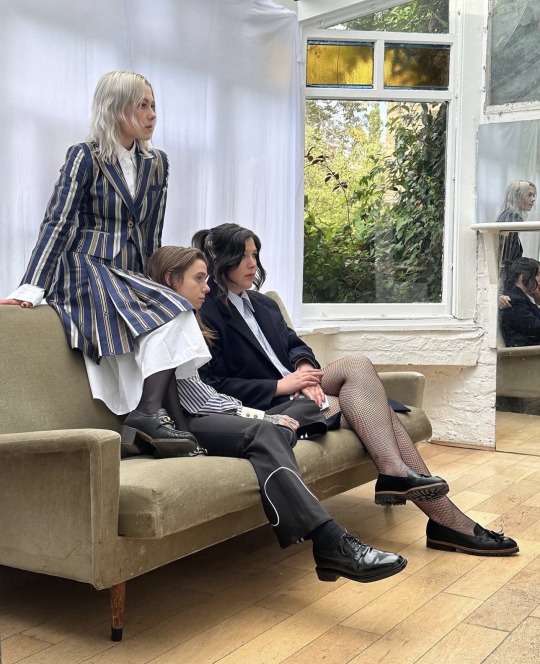

(x)(x)(x)
#boygenius#julien baker#lucy dacus#phoebe bridgers#hommegirls#2023#november 2023#interview#bts#video#archival
19 notes
·
View notes
Text

“It was during the four or five years of moving around restlessly, concentrating on the 'distant horizon', that I developed the mental trick of brushing aside the worm's eye view. Van Gooh's affirmation-experiences were never subjected to logical analysis, so that he could never be sure, looking back on them later, whether they were not simply bursts of emotional euphoria, with no objective significance. Once I had got used to the idea that the insight had nothing to do with emotion—that it was always a vision of the same landscape—this kind of doubt ceased to be an important factor.
This 'vision' of my 'wanderjahre' period was not a consummation, like an orgasm; it always produced a strong sense that I was only at the beginning. The next problem was to map the landscape, to explain the mechanisms of consciousness and the way they can lead to affirmation-experiences or to morbid paranoia. This proved to be harder than I had anticipated, because ordinary psychology, of the kind created by Freud and Jung, proved to be quite useless. Existentialism provided a better starting point, but that was equally frustrating because the major figures—Kierkegaard, Heidegger, Sartre, Camus—were as riddled with pessimism and the 'passive fallacy' as Beckett. Sartre's world-negation seemed to me as unperceptive as Graham Greene's, merely a sign of an inability to think clearly. He keeps confusing consciousness as a general concept with personality-consciousness. So that Simone de Beauvoir can write (in Pyrrhus and Cinéas): I look at myself in vain in a mirror, tell myself my own story, I can never grasp myself as an entire object, I experience in myself the emptiness that is myself, I feel that I am not', and imagine that she is describing a general characteristic of all consciousness, instead of ordinary superficial mono-consciousness. As soon as one reads Mile de Beauvoir's volumes of autobiography, or Sartre's Words, one can see exactly why they made this basic error; neither of them possess that capacity for poetic experience—affirmation-consciousness—that came so naturally to Wordsworth.
And the chief characteristic of the opposite of affirmation consciousness—I suppose one might call it depression-consciousness—is that when you are in it, it seems totally convincing; like a very brilliant liar, it can account for everything in its own terms. Aldous Huxley invented the rather useful term 'minimum working hypothesis' about religion—i.e. what can we state definitely about it without going off into 'faith' or speculation. Well, the minimum-working-hypothesis for depression-consciousness is that the world is real and permanent, and we are not very real and not very permanent. (One of the most convincing expressions of it in literature is Wells's Mind at the End of its Tether, that final work in which he thought the universe was falling to pieces.)
At this point, it might seem relevant to ask the question: What about death? Does this fundamentally optimistic philosophy have anything to say about the final problem? If not, then surely it has no right to condemn Sartre, Greene, Beckett and the rest for being short-sighted?
This is not quite so. Although I do not believe the question of death to be ultimately beyond human solution, it is not particularly relevant at this point anyway. Suppose I were a building contractor, and I say: I think it would take me about two years to erect a thirty storey building,' and someone replies: 'Oh no, because you might die at any moment', this would quite clearly be a logical non sequitur. What I am stating here is that the greatest human mistake is the belief that ‘the natural wakeful life of the ego is a perceiving'—in Husserl's phrase. It isn't. At least, the normal understanding of this idea involves a fallacy; that perceiving is a passive occupation, like sleeping. I have tried to show that this mistake arises from the efficiency of our human robot. This robot might be compared to a super tax-accountant, who is so efficient that he gets his hands on all your money before you receive it yourself, and deducts tax for you, so that you never have any tax bills. And when people mention tax, you say with sincerity: I've never paid any in my life.' The flat truth is that you are too stupid to understand your own business affairs. However, your invisible tax-accountant is completely dependent on you. If you stop earning money, he won't be able to support you. The same is true of the robot. The energy that sustains your everyday perception comes from you. So do those bonuses of duo-consciousness, that startle you as pleasantly as a tax rebate. What human beings will slowly develop, as we advance up the evolutionary scale, is a deepening consciousness of these transactions of the robot, so that the chance element disappears from the ups and downs of consciousness. And eventually the problem of death itself will come within the range of our self-knowledge for any doctor will confirm that the body's health depends, in some strange way, upon the mind. And, at the present stage, this is all it is possible to say.
To summarise. All great changes involve a doldrums period, a time of fallowness. When a backward country changes over from agriculture to industry, the immediate result is misery and starvation for farm workers. The human race has been going into a new phase of evolution at a steadily accelerating pace, and the end is now in sight. Man deliberately abandoned the warm richness of animal consciousness for something altogether bleaker and harder. He has not done it deliberately and determinedly, but in brief spurts, with many backslidings. His attempt to conquer nature and improve his position have made life so complicated that the old phrase about the 'gift of life' begins to take on ironic overtones. Laziness and timidity are no longer qualities that can be tolerated by the force behind evolution. Human beings of the 21st century will be born into a forbidding world: a civilisation that is immense, aloof, heartless and highly mechanised. Men of genius will find it a frightening world, for it will look so impersonal and vast that there will seem to be no room for individuality. Roads to the top will be well marked, but they will involve a discouraging amount of specialisation, of adjustment to the demands of mass-organisation. And since men of genius naturally hate to conform, it seems likely that the present tendency to negative revolt will increase, as they fire off blasts of loathing at the clockwork octopus that holds them fast. This will only make things worse, for nothing destroys the will quicker than the conviction that there is no point in willing. It looks like a vicious circle; there seems every reason to assume that human beings have chosen a self-destructive route to dominance, and that things are bound to get worse, until the whole miserable chaos explodes and we plunge back into a relaxing barbarism.
This is why it has become so important that we grasp what is happening. Human consciousness has been on half-rations for a long time now; but in an important sense, this is by our own choice as a man might fast to lose weight, or save money to finance a business. A point has arrived where we can afford to reap the first harvest. Because we have not permanently forsworn the warmth and richness of animal consciousness. We have set out to develop ways in which we can have the enrichment without its dis-advantages: laziness, incompetence, lack of purpose. We chose purpose, and accepted the sudden drop in the pressure of consciousness that went with it. The east always found it easier to achieve ecstasy than the west, because the eastern temperament tends to be less purposive (this may not continue to be true, though), and so far, that has been the equation that governs human existence: purpose and the tightening of the belt, or happiness and drifting. But expressed in this way, we can see that it does not have to be so. We left purpose to the robot, because consciousness had to be economised: we had to use it for immediate problems. And now a time has come when it is not only true that we can afford to relax—and take the horse out of its harness—but when it has become a matter of urgency that we do so. The new complexity of our civilisation demands a more leisurely, enriched type of consciousness. The old obsessive energy must be turned into self-knowledge, the attempt to illuminate the realm of the robot, to gain conscious control of its vast resources of power.
For I must repeat the assertion with which I began: we possess such immense resources of power that pessimism is a laughable absurdity. Yeats's old Chinamen are gay because they know. They have broken through. They no longer suspect—as Faust does—that knowledge may be the death of us, by revealing new vistas of futility, and the ultimate impossibility of knowing anything at all. They have pushed knowledge further still: and what they now know fills them with a tremendous, quiet satis-faction. That is why 'their ancient, glittering eyes are gay'.
Why do I believe that this is the crucial point in human evolution? Why not in the year 2000 or 25000?
There are two reasons, and I have already discussed the first: that we can choose when we shall turn the questing intellect that has built the cyclotron and the moon rocket to the scientific exploration of man's inner being. And now is a good time to choose—now that there is more leisure available to more people than at any time in history.
But I also believe that the inner forces of history are pushing us towards the moment of choice. Man has been having 'mystical' experiences for as far back as written records extend; but they were restricted to a few rare souls. In the 19th century, we suddenly discover what can only be called a mass hunger for mystical experience that is, for rejection of the imperatives of everyday existence and for an intenser form of inner-experience. Romanticism is the expression of a deep instinctive desire for the life of the mind, and we are still in the midst of the romantic period. The stomach of the romantic rejects everyday existence as Bombard's stomach rejected the squashed fish; but he has no clear idea of an alternative to it. Like Wagner, he believes that the world of the mind is based upon 'wahn', illusion, and that to reject "life' is the same thing as choosing death. What he is failing to grasp is that human beings are the only terrestrial creatures for whom the word 'life' has two distinct meanings. For an animal, 'life' is what it sees when it opens its eyes in the morning; that is all. But even a fairly unintellegent human being—let us say, a provincial lad on his way to see the Cup Final in London—can say 'Eh, lad, this is life!', and mean that he suddenly perceives that 'life' means something bigger than his individual life. Human beings are the only creatures with some ability to grasp 'life' in this bigger sense. And this is the aim of our evolution, the purpose for which we rejected animal 'oneness' with nature. We are capable— in theory—of living 'life' in the broader sense.
The trouble is that our habits are against it. Imagine a soldier from Napoleon's army, returning from the Russian campaign to his small village where nothing ever happens. He sees clearly that these people are wasting their lives by living so narrowly; he knows 'life' is bigger. But if he stays in the village for six months or so, he too will forget this broader life, and allow his senses to shrink to the confines of village gossip. The problem is to stretch the mind 'beyond immediacy', and our chief defect is that it takes crisis or misery to make us do it. And yet we possess a power possessed by no other animal-this power called imagination—and its purpose is not—as I have already remarked—to allow people to live in 'a world of imagination', but to enable them to point the mind towards the broadest possible meaning of life'. In the 19th century, the impulse became so powerful in the higher types of human being that it outstripped their interest in the narrower sense of 'life'. In the 20th century, this disgusted rejection of 'life' has become stronger. Wagner and Tennyson represent a rich autumn; Kafka and Beckett a bleak, grey winter. It is impossible for rejection to go further; the turning point has to come.” - Colin Wilson, ‘Poetry and Mysticism’ (1969) [p. 92 - 97]
11 notes
·
View notes
Text
all of it
thought about the movies everything everywhere all at once and the half of it today until i was sick. eeaao because i was analyzing joy wang's character as a nihilist and the half of it because i'm writing a final paper comparing it to sartre's no exit.
i'm so behind on this class, it's not even funny. it's called literature & existentialism and i picked it because i thought i would like it. i was supposed to like it. then again i was also supposed to take another lit class and consider the major this semester and none of that happened either. when i did wake up in time, i'd go to this class and sit in the back and try to just listen in, and the professor would call on me for nodding off.
but it'll be okay. my discussion post is a month late but i talked about how jobu tupaki searched through all possible universes for a version of a mother who loved and understood her. how she was driven to give up her sense of freedom and agency in the face of these pressures from her mother -- to be straight, college-educated, skinny, more fluent in chinese, less americanized -- and succumb to the conclusion that nothing matters. i have an idea for the thesis for my final paper -- in class we learned about sartre's framework for the concept of "the other" and how profoundly disturbing it is to be in the presence of another person, because as the center of your own universe you are in control of the meaning you choose to give to the world, and when another person is within your universe, your agency is being chipped away. you -- and your meaning -- become chained to the other's judgment of you. and for the half of it i was thinking about different ways people try to take back control of their narrative from the other, whether that's through overexplaining or overexposure of yourself or through physical distance from the other.
there's other things, more important things, about both movies that an existentialist framework could never fully explain away. i thought about evelyn, when facing the possibility of losing her own daughter to the black hole, asking helplessly to her father how he found it in himself to let her go. i thought about the lights from the failing laundromat, the smashed windows, the glass on that dark street, and mother and daughter trying so hard one more time to listen to each other, even though it hurts so much. then i thought about the ending of the half of it, paul munsky running after ellie chu's train, knowing that it's futile and that she's going where he can't follow, but doing it anyway because it was her favorite scene from the movie ek villain and he remembered. he remembered because he loves her. no drawn-out 60-page essay, translated to english from french, laying out a blueprint for how a man should face the burden of his freedom or his death or whatever, could dream of capturing this.
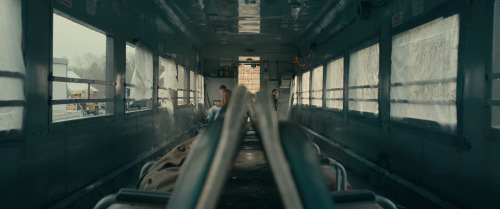
#eeaao#the half of it#emotional support chinese-american queer films#why i don't like lit that much anymore
83 notes
·
View notes
Text
Fic Preview:
It’s surprisingly easy to lie to Evan. A missed flight is a plausible enough thing, after all; he knows how exhausted she’s been these past few months. Running herself ragged while Julia has been off gallivanting around France and barely writing a recipe a week, if that, and Sartre has been moping around Paris feeling half-dead inside with nothing to show for it, and Blanche has been walling herself into her darkened office and driving away the only person who cares enough to turn on the lights for her.
Judith calls down to the front desk to book herself another night and pointedly does not ask about any telegrams that might have arrived for her.
A day…that’s all she needs. A day to herself to find the inspiration and relief and rekindling that JP and Julia and Simca and everyone else had absolutely failed to give her.
A luxuriously long, hot shower leaves her feeling significantly more human, and by the time the midday sun is warming her shoulders in front of Paul, she feels like she can breathe again.
The hot chocolate and pasty are decadent enough on their own, but time is the real indulgence. She meant it when she told the waiter she wouldn’t be leaving for a good long while. Sure, she’s working even now, but the air around her feels lighter than it ever could deep in the halls of Knopf where everything is dark carpets and gleaming mahogany. The sun is brighter here than it seemed to be back in New York and Boston, too. Hell, even the food seems remarkable—if only for its arrival with no fuss, no quibbling over seasoning and American customers and French authenticity, no endless bickering from two women far too old and behind on their deadline for Judith to tolerate it with good humor.
As midday stretches into early afternoon, Judith allows herself a second hot chocolate. Who knows the next time she’ll be in Paris, after all.
It isn’t long after it’s been delivered that she spots a familiar face weaving through the throngs of people that have gathered on the patio.
Avis sits down two tables over before glancing up and spotting Judith. She cocks her head to the side, brows drawing together even as a smile pulls at the corners of her mouth. “I thought you’d gone back to New York,” she says, ambling her way over to Judith’s table and gesturing at the empty seat across from her.
Judith motions for her to take it. “I decided to miss my flight.”
Read the rest on AO3!
#julia hbo#judith jones#avis devoto#judith x avis#fanfic#smut#one-night stand fic#everyone gets to be angry and indulgent all at once!#ao3feed
26 notes
·
View notes